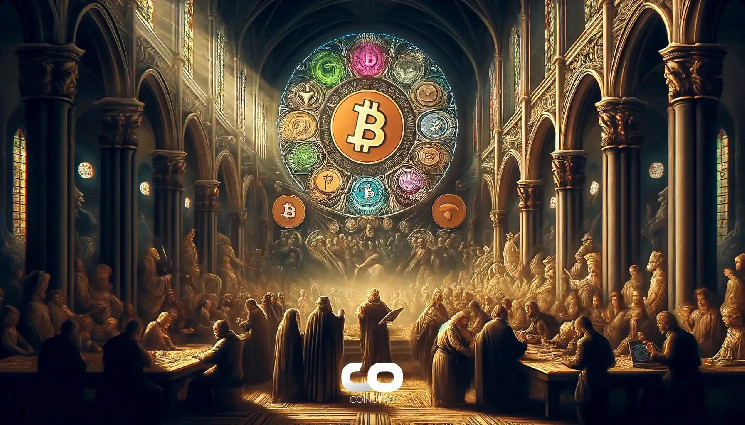BlackRock’s Bitcoin Endorsement: A Paradoxical Impact on the Cryptocurrency Landscape
BlackRock, the world’s largest asset manager, recently released a video promoting Bitcoin, marking a significant moment for the cryptocurrency’s mainstream acceptance. However, this endorsement, seemingly positive on the surface, has sparked considerable controversy within the Bitcoin community. The video’s disclaimer questioning Bitcoin’s fixed supply of 21 million coins has triggered concerns and highlighted the complex relationship between institutional adoption and the core principles that underpin the cryptocurrency’s value. This incident underscores the delicate balance between attracting institutional investment and maintaining the trust of the existing Bitcoin community, a tension that will likely shape the future trajectory of the digital asset.
The video, featured on the iShares Bitcoin Trust (IBIT) ETF page, traces the evolution of money, culminating in the emergence of Bitcoin. While ostensibly praising Bitcoin’s innovative qualities, the disclaimer casts doubt on its defining feature – the limited supply. This seemingly contradictory message has generated significant backlash from Bitcoin enthusiasts, who view the fixed supply as a crucial safeguard against inflation and a cornerstone of its value proposition. The concern is that by questioning this fundamental principle, BlackRock, a financial behemoth, may inadvertently undermine confidence in Bitcoin, especially among potential new investors who are just beginning to understand the intricacies of digital currencies.
The controversy highlights the paramount importance of trust within the cryptocurrency ecosystem. Bitcoin’s decentralized nature and lack of a central authority mean that trust in its underlying code and principles is paramount. The fixed supply, coded into Bitcoin’s protocol, is a cornerstone of this trust. It guarantees scarcity, a characteristic that differentiates it from fiat currencies prone to inflationary pressures. By suggesting that this supply is open to question, BlackRock’s video, albeit unintentionally, introduces an element of uncertainty that could erode this fundamental trust. This incident serves as a cautionary tale, demonstrating the potential for conflicting narratives to negatively impact the perception and adoption of cryptocurrencies.
The reaction from the Bitcoin community, often characterized by its strong conviction in the cryptocurrency’s principles, has been swift and critical. Many long-term Bitcoin holders, known as "hodlers," view the fixed supply as inviolable and see BlackRock’s disclaimer as a misrepresentation of Bitcoin’s core value. Their concern is that this type of messaging could deter newcomers from embracing Bitcoin, hindering its widespread adoption. The incident reveals a growing tension between the desire for institutional investment, often seen as a catalyst for mainstream acceptance, and the preservation of the fundamental principles that initially attracted individuals to Bitcoin.
The market reaction to BlackRock’s video has been mixed, reflecting the broader uncertainty surrounding the cryptocurrency’s future. While some analysts see BlackRock’s involvement as a positive sign, others worry that the disclaimer could negatively impact Bitcoin’s price and long-term prospects. In a market characterized by volatility and increasing regulatory scrutiny, any ambiguity surrounding a cryptocurrency’s fundamental attributes can lead to investor hesitancy. Furthermore, as institutional players like BlackRock become increasingly involved in the cryptocurrency space, their messaging and actions will play a significant role in shaping the regulatory landscape and influencing investor sentiment.
This incident underscores the complex interplay between institutional adoption and the core ethos of cryptocurrencies like Bitcoin. While institutional investment can bring much-needed legitimacy and capital to the market, it also carries the risk of diluting the very principles that attracted early adopters. The challenge for the cryptocurrency community is to navigate this complex landscape, attracting institutional interest without compromising the foundational values that underpin its unique appeal. The future of Bitcoin, and indeed the broader cryptocurrency market, will likely depend on striking a delicate balance between these competing forces. The BlackRock incident serves as a valuable lesson, highlighting the importance of clear, consistent messaging and the need for institutional players to fully understand and respect the underlying principles that drive the cryptocurrency ecosystem. The ultimate impact of this incident remains to be seen, but it serves as a crucial reminder of the power of narrative and the vital role of trust in shaping the future of digital assets.


